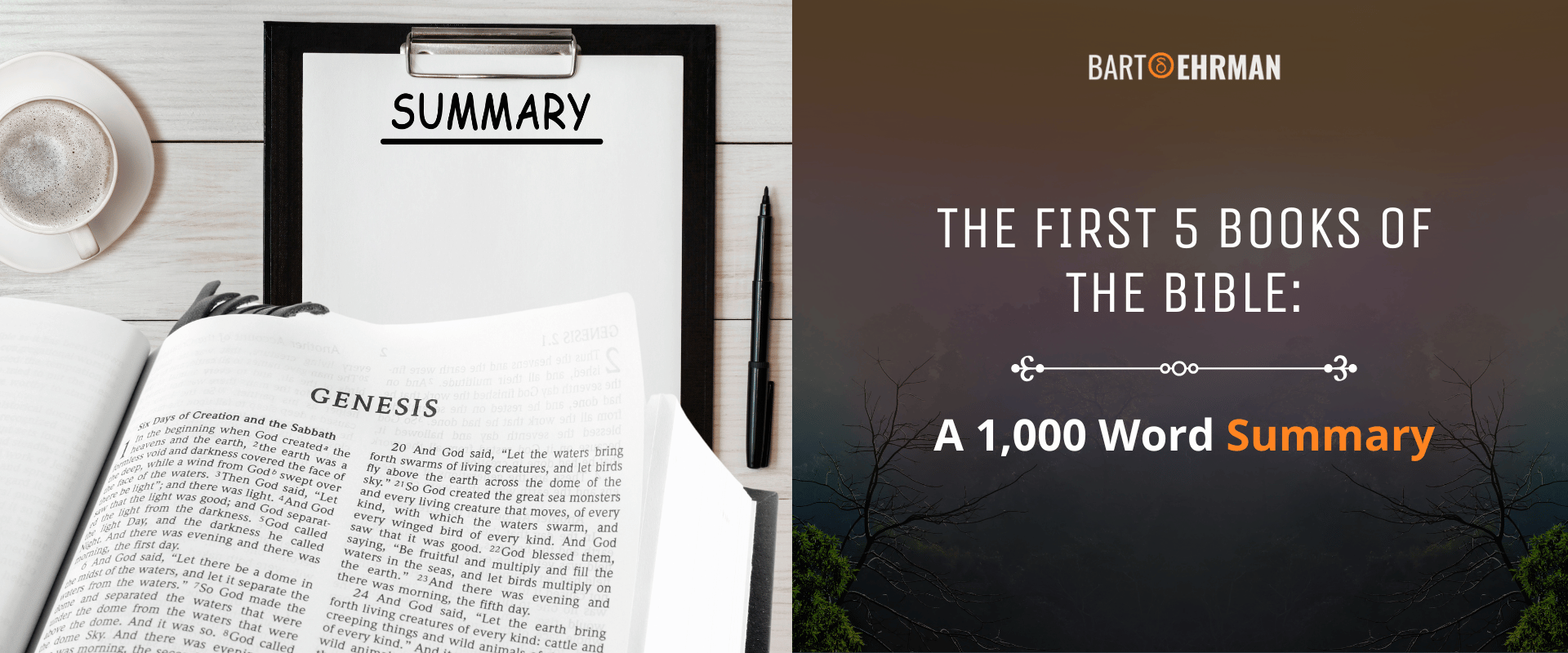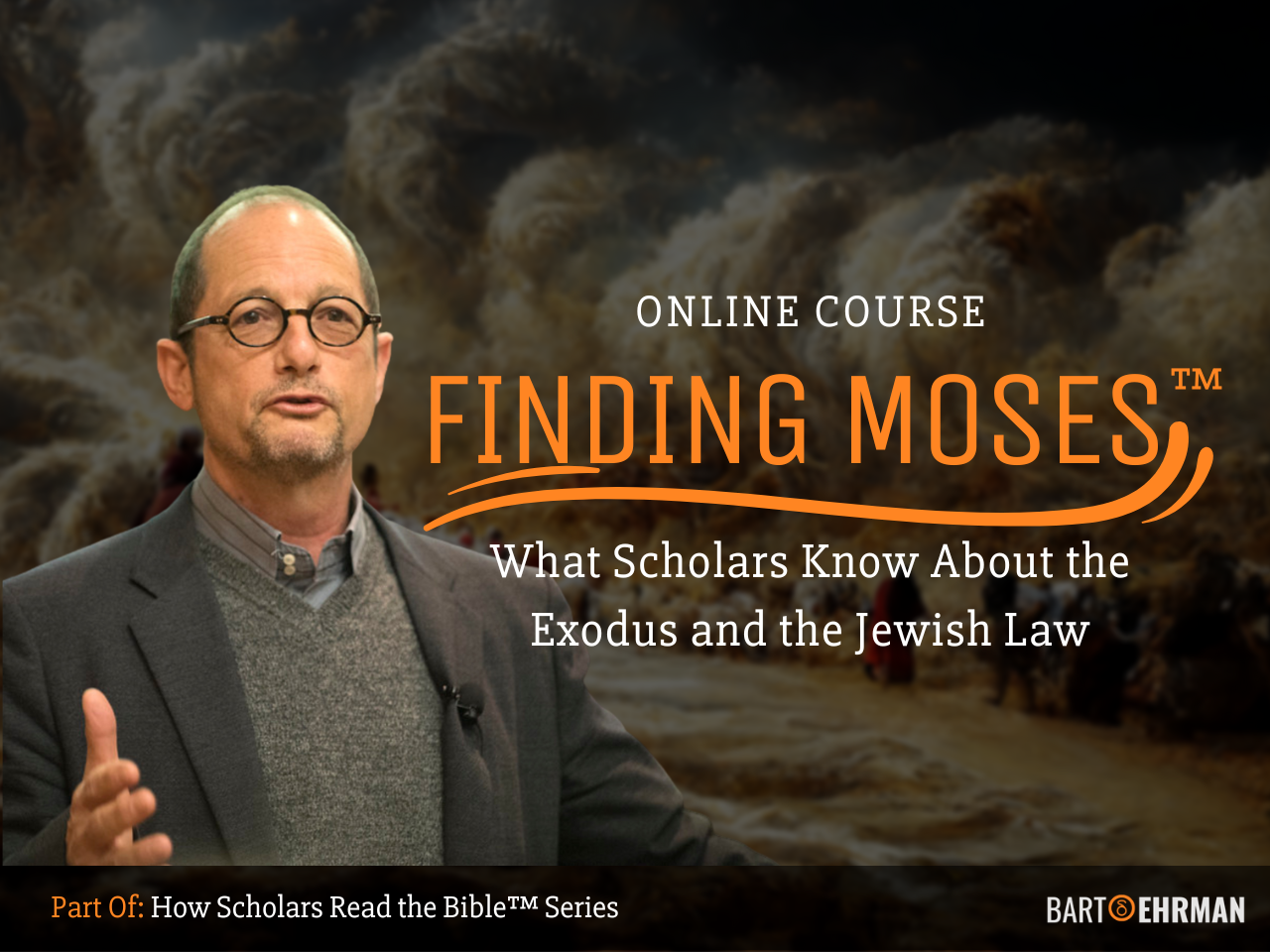The First 5 Books of the Bible: A 1,000 Word Summary

Written by Joshua Schachterle, Ph.D
Author | Professor | Scholar
Author | Professor | BE Contributor
Verified! See our editorial guidelines
Verified! See our guidelines
Date written: February 22nd, 2025
Disclaimer: The views and opinions expressed in this article belong to the author and do not necessarily match my own. - Dr. Bart D. Ehrman
The first five books of the Bible recount key moments of divine intervention, including the fall of humanity, the great flood, the exodus from Egypt, and the rules that would govern Israel's identity and worship.
Along the way, these books offer laws, guidance, and covenants that would shape the future of Israel and its relationship with God. In this article, I’ll offer a concise, 1,000-word summary diving into key events, characters, and themes that make up these central texts.

What Are the First 5 Books of the Bible Called?
The first five books of the Bible — Genesis, Exodus, Leviticus, Numbers, and Deuteronomy — cover the creation of the world, the establishment of the nation of Israel, and the enslavement and subsequent liberation of the Israelites from Egypt. Altogether, they comprise 250 to 400 pages, depending on the edition and the translation. Don’t worry if that seems daunting, though, because this article will give you a quick 1,000-word summary of all five books.
As a unit, these books are sometimes called the Pentateuch, a word derived from Greek meaning “five books.” Within Judaism, they are called the Torah, a Hebrew word meaning “teaching” or “guidance,” and are absolutely foundational to the religion. Later translators of the Hebrew Bible rendered the word Torah into Greek as nomos or “law.”
Who wrote the first five books of the Bible? They have been traditionally attributed to Moses, but scholars have long known that this is a misattribution. Instead, the 5 books of the Pentateuch were written anonymously. In his book How the Bible Became a Book: The Textualization of Ancient Israel, William M. Schniedewind writes that the notion of crediting authorship was not deemed significant by the ancient society that created the Pentateuch. In The Composition of the Pentateuch: Renewing the Documentary Hypothesis, Joel Baden writes that at least four different authors wrote the books.
(Affiliate Disclaimer: We may earn commissions on products you purchase through this page at no additional cost to you. Thank you for supporting our site!)
Now that we know a little background about the first 5 books of the Bible, I’ll give you a synopsis of their contents.
A 1,000-Word Summary of the First Five Books of the Bible
In Genesis: In the Beginning, Dianne Bergant notes that Genesis, the first book of the Bible, can be divided into two parts: the Primeval history and the Ancestral history. In the Primeval history, we read about God’s creation of the world, including Adam and Eve, the first human beings. After they sin against God, Adam and Eve are expelled from the paradisal Garden of Eden. This initial sin then leads to a general corruption of the world which culminates later in God’s destruction of the world and (almost) all its inhabitants by a great flood. Only a righteous man named Noah and his family are spared and left to repopulate the earth.
The Ancestral history then begins to outline the narratives of the progenitors of the nation of Israel, beginning with Noah’s descendent Abraham. God instructs Abraham to leave his home in the land of Ur and journey to the land of Canaan where he ultimately makes a home, along with his son Isaac and his grandson Jacob. Jacob’s name is later changed by God to Israel, which is the origin of the name of the nation of Israel. He and his clan eventually end up traveling to and living in Egypt, thanks to Jacob’s son Joseph who uses his political power in Egypt to save them from famine.
However, the next book, Exodus, begins years after the end of Genesis with the Israelites having been enslaved by the Egyptians. God then chooses a man named Moses, an Israelite raised in the Egyptian royal court, to lead them out of slavery. Moses, using God’s power, inflicts terrible plagues upon Egypt until the Pharaoh finally succumbs, willingly letting the Israelites go. Following Moses, the Israelites then embark upon a long, grueling journey through the wilderness, arriving at Mount Sinai. There, God promises to give them the land of Canaan once promised to Abraham if they are loyal to him and to no other gods.
Israel thus enters into an agreement or covenant with God, who issues laws to guide them. He also instructs them how to build the Tabernacle, a mobile sanctuary intended to be the dwelling place of God when he descends from heaven to dwell with the Israelites. God thus calls them his chosen people.
The third book of the Bible is known as Leviticus, named after the priestly tribe of Israel known as the Levites. The book begins with detailed instructions from God on how to properly use the Tabernacle they built in the book of Exodus. Then God gives them the rules about what is clean and unclean, including which animals may be eaten and how to slaughter them, how the ceremonies of the Day of Atonement (Hebrew: Yom Kippur) are to be performed, and other ritual and moral rules. God also gives them a long list of punishments they will incur if they don’t correctly follow these laws, as well as the rewards they’ll receive if they do. The book ends with the establishment of the rite of sacrifice in the Tabernacle.
The book of Numbers comes next, its title a reference to a census Moses takes on God’s behalf in the first several chapters in order to count the Israelites. In the beginning of the book, the Israelites are at Mount Sinai, having received the divine laws and covenant while God comes to dwell with them in the Tabernacle. The next step should be conquering Canaan, the land God has promised to them.
After counting the Israelites, Moses continues to lead them toward Canaan. However, the Israelites grumble and complain about the arduous journey, and God kills thousands of them for this offense. At Canaan’s borders, 12 spies are sent into Canaan to survey the inhabitants they will have to defeat. Ten of the spies come back fearful that Israel will not be able to conquer the land, which they claim is populated by giants. The two other spies, Joshua and Caleb, disagree, advising instead that they advance and conquer the land immediately. For the fearfulness of the ten spies, God condemns their entire generation to die outside Canaan in the land of Moab, declaring that the next generation of Israelites will be able to conquer the land.
The final book of the Pentateuch is called Deuteronomy, derived from a Greek word meaning “second law” or “repetition of the law” because it reiterates the commandments given at Sinai. While Deuteronomy contains 34 chapters, the first 30 consist of three speeches or sermons given by Moses to the Israelites at Moab before they enter Canaan.

The first sermon summarizes the 40 years the Israelites wandered in the wilderness to arrive at the borders of Canaan, followed by encouragement to follow God’s law. The second again encourages them to follow the law, insisting that their success in taking possession of Canaan depends on their faithfulness to the law. The third and final speech assures the Israelites that even if they violate the law, they will be given the opportunity to repent.
The final four chapters contain two poems, the Song of Moses and the Blessing of Moses, as well as stories about Moses granting leadership of the Israelites to Joshua and, finally, the death of Moses on Mount Nebo, still outside the promised land of Canaan.
Conclusion
The first five books of the Hebrew Bible are called the Torah — “teaching” or “guidance” — in Hebrew. In the later Greek translation, they were called the Pentateuch, a Greek word simply meaning “five books.” They provide the foundation for both Judaism and Christianity.
While the Pentateuch has long been associated with Moses as the author, scholars know that the five books were authored by numerous parties, with a later editor placing them together as five parts of a single unit.
The first 5 books of the Bible cover a vast array of stories, beginning with the divine creation of the world, the ancestors of Israel, the enslavement and liberation of Israel, and the journey to enter the promised land of Canaan. They contain characters essential to the story of the establishment of the nation of Israel, including Abraham, Isaac, Jacob, and Moses. These stories and characters form the basis of religious traditions that have endured for millennia throughout the world.

